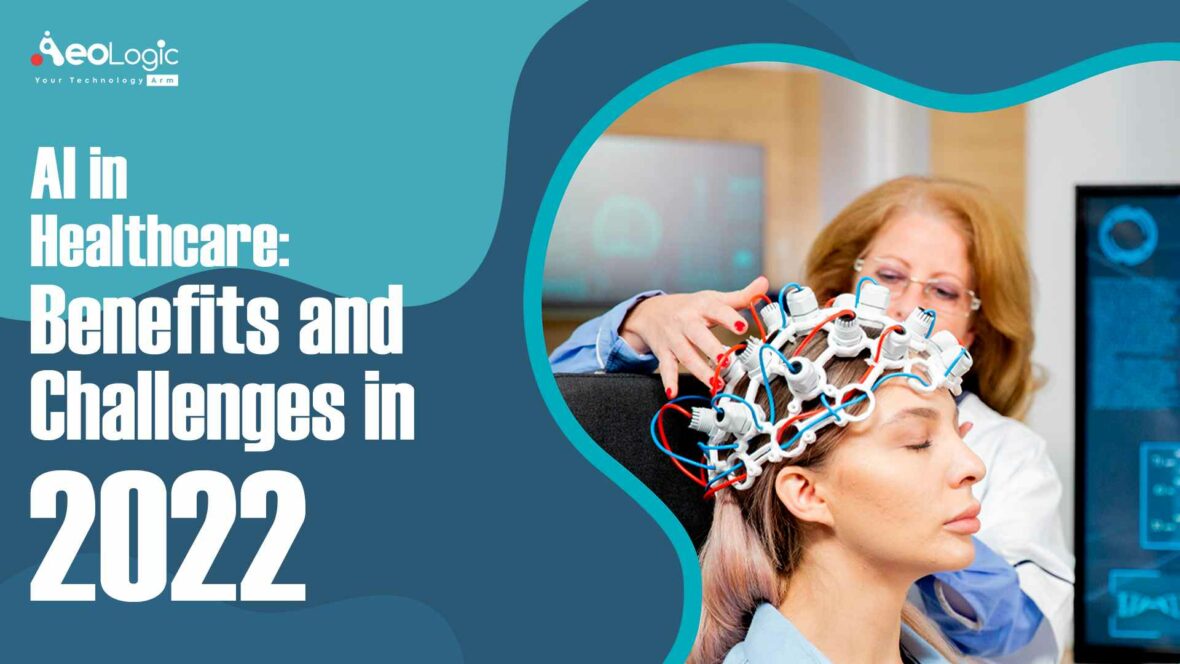Artificial intelligence has often been depicted as brute robots ready to take over the world. But in reality, the implementation of one of the most advanced technologies that is artificial intelligence also commonly known as AI can actually save lives and improve healthcare for millions of patients around the world.
AI is helping in revolutionizing the healthcare industry by personalizing the delivery of care, making hospitals more efficient, and improving access to healthcare by providing accurate decision-making tools.
In this blog, you’ll get to know about the benefits and challenges of implementing AI in healthcare.
A Brief About Artificial Intelligence In Healthcare
AI is a process of educating a computer model using complex and large data sets. The model learns from this data in a training process to build its ability to make decisions or predict outcomes when presented with new information.
Artificial intelligence (AI) enables in having access to a computer model that knows, based on the experience of thousands of other patients, whether a treatment is likely to work and what works best for that patient based on their individual conditions.
AI models help doctors by learning from patients with similar conditions or even similar genetic information and making highly informed decisions about their diagnosis and their treatment options.
AI In Cancer Treatment Is One Of The Biggest Benefits For Healthcare
A cancer diagnosis can be immensely complicated, both for the doctors in making decisions about diagnosing a primary or secondary cancer and for the patients, in understanding the risks and success rates of the treatment options.
But AI models are getting developed so that they can help in streamlining this process by taking information from a number of different sources. AI models will feed themselves from the data from the patient’s blood tests, X-ray images of the suspected lesions, as well as genetic information from a tissue biopsy.
The trained AI model can rapidly consolidate this information and provide highly accurate predictions of the patient’s diagnosis, treatment options most likely to succeed, as well as prognosis.
For example, there is a lady named Lisa, who is a cancer patient. She’s gone through a comprehensive clinical assessment, imaging, and various other diagnostic workups, but not even the best doctors in town can tell where her cancer primary site is. This means she can’t get a treatment specific for her cancer, this limits her chances of surviving for another five years is less than 10 percent.
But with the implementation of AI and patients’ genetic information, there are certain tools out there that can accurately identify cancer primarily site for Lisa. This will empower doctors to give Lisa a treatment that will be going to work best for her.
This type of model can be expanded exponentially to predict accurate health care. Hence, it can be stated that using an AI model to understand whether a certain population is more susceptible to a certain disease and whether they would respond more favorably to certain healthcare interventions.
Challenges Of AI In Healthcare
Undoubtedly, the implementation of AI is giving the world the ability to have a much more refined and detailed understanding of human health than we’ve ever had before. But there are challenges to the immense promise of AI being implemented into routine clinical practice.
Our existing regulatory frameworks aren’t designed for AI software intended for diagnosing, treating, or managing the disease, also known as AI-based software as a medical device.
They are designed for physical medical devices, like surgical implants, or most software that have the same output every time that the patient or clinicians are using them.
Traditional software is static in the sense that the developers release a version of the software and no matter how many times we use it, it would always have the same output for the same data.
On the other hand, AI software behaves completely differently from most software in healthcare because of the intrinsic ability to learn and evolve over time, ideally becoming more intelligent and suited to the environment in which they’re being used.
Conclusion
To sum up, it can be said that the healthcare we have been used to is getting revolutionized with the implementation of advanced technology like artificial intelligence (AI). Cancer is one of the most dangerous diseases for all human beings, and simplifying the complexity it has in its diagnosing and treatment is a big task on its own. On the other hand, one should also address the challenges AI is facing in healthcare so that they could be overcome too in the coming future.
Are you looking to implement artificial intelligence into your healthcare business? If yes, so, please feel free to contact us at support@aeologic.com






